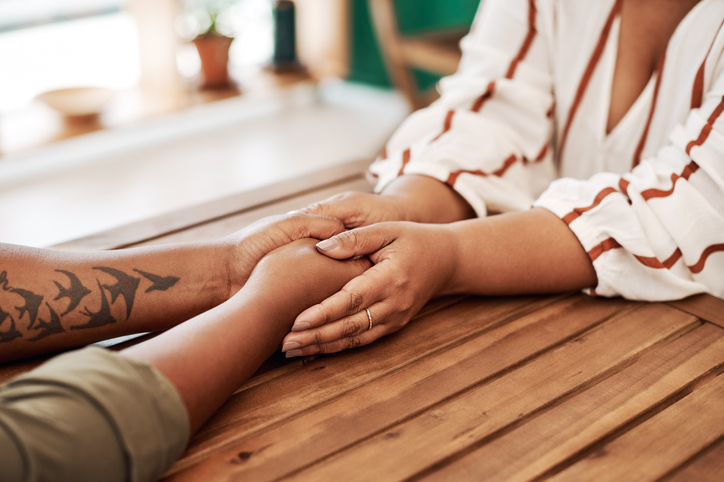10 Things You Shouldn't Speak On If You Haven't Experienced Them
Life Will Humble You: 10 Things You Shouldn’t Speak On If You Haven’t Experienced Them
Share the post
Share this link via
Or copy link

Source: blackCAT / Getty
One of the most powerful lessons my grandmother taught me before she left this earth was to refrain from speaking on things that I’ve never experienced. “Life is long and you never know where you’ll end up before all is said and done,” is what she would often tell me and my cousins just as we got to running our mouths on things we knew nothing about. While it would be years after her passing before that lesson truly began to resonate and have significant meaning in my life, I’m eternally thankful for her teaching because life has a way of humbling you– fast. Here are 10 things to avoid speaking on unless you’ve experienced them personally.
Being black
It’s always interesting to hear people of other racial backgrounds attempt to offer their two cents on what it means to be Black in America. Non-black people love to run their mouths about what Black people should and should not find offensive and will not hesitate to argue you down about how all Americans are granted the same opportunities. All the while, they have never and will never walk a mile in a Black person’s shoes.

Source: valentinrussanov / Getty
Losing a parent
Losing a parent is an experience that most will never be able to comprehend until they’ve actually experienced it. Reading about it, knowing someone who went through it, or even having a parent who was never around at all is not the same as experiencing the death of a parent.

Source: Maksym Panchuk / EyeEm / Getty
Being in an abusive relationship
Love MadameNoire? Get more! Join the MadameNoire Newsletter
We care about your data. See our privacy policy.
It’s easy to pass judgment on a woman who can’t seem to break free from an abusive relationship, but these situations are never black and white. There are various aspects that come into play when considering losing an abuser that a person who hasn’t had this experience doesn’t even take into consideration.

Source: mrs / Getty
Losing a child
Losing a child is something no parent should ever experience. According to some psychologists, it’s the worst type of trauma that a person could ever face.
“The death of a child is considered the single worst stressor a person can go through,” Deborah Carr, chair of the sociology department at Boston University, told Fatherly. “Parents and fathers specifically feel responsible for the child’s well-being. And they’re not just losing a person they loved. They’re also losing the years of promise they had looked forward to.”

Source: Klaus Vedfelt / Getty
Battling addiction
When you’ve never experienced addiction, it’s easy to pass harsh judgment on those who are struggling. Addiction is a powerful force and while one may very well have the desire to stop using whatever substance of choice and do better for themselves and their families, sobriety is a constant battle.

Source: kate_sept2004 / Getty
Raising kids
Before becoming a parent, many pass judgment on how people parent their children. It’s easy to sit on your high horse and say, “My child would never,” but the reality is that you never really know how things are going to play out once you have kids of your own.

Source: PeopleImages / Getty
Growing up with an absent parent
Having a living parent who chooses to be absent from your life creates an emotional void that can stay with a person for a lifetime. It’s tempting to have a “get over it” attitude and be dismissive of adults who have had this experience, but it’s a struggle that is hard to comprehend unless you’ve lived it.

Source: kate_sept2004 / Getty
Living with a mentally ill loved one
Supporting a loved one who has a mental illness can look very different from family to family, especially when that loved one refuses to get help. People who have never been in this position are usually quick to offer oversimplified solutions regarding what needs to be done to get that person the help that they need, but the reality is usually much more complex.

Source: Oleg Golovnev / EyeEm / Getty
Getting a divorce
The average break-up should not be compared to a divorce. Oftentimes, there are no lawyers, assets, or children involved. It’s can be tempting to assume that you know what a divorced friend is going through because we’ve all experienced a break-up before, but more than likely, you don’t, unless you’ve been in her shoes before.

Source: Klaus Vedfelt / Getty
Battling depression
Depression is not sadness. Sadness is a typical human emotion while depression is the result of various internal factors including a chemical imbalance. When you’re struggling with depression, it’s never a matter of “pulling it together” or “snapping out of it.” It’s easy to speak on what you would do if you were in a depressed person’s shoes but the reality is that you could never truly know what it’s like until you’ve experienced depression yourself.
Related Tags
Newsletter






